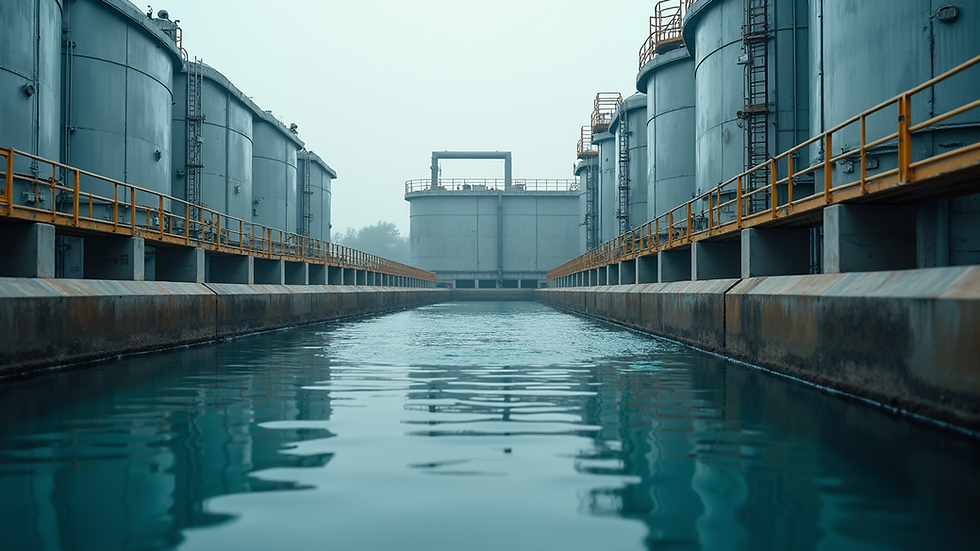Understanding Industrial Wastewater Treatment in India
- palwinder kaur
- Oct 6, 2025
- 4 min read
Industrial growth in India has been rapid and significant, contributing to the country's economic development. However, this growth has also led to increased environmental challenges, particularly in managing wastewater generated by various industries. Proper treatment of industrial wastewater is essential to protect water bodies, public health, and comply with environmental regulations. This article explores the key aspects of industrial wastewater treatment in India, providing insights into processes, types, and best practices.
The Importance of Industrial Wastewater Treatment in India
India's industrial sector produces a substantial volume of wastewater containing harmful pollutants such as heavy metals, chemicals, and organic waste. Untreated wastewater can contaminate rivers, lakes, and groundwater, posing serious risks to ecosystems and human health. Industrial wastewater treatment is crucial for:
Reducing environmental pollution: Proper treatment removes toxic substances before discharge.
Conserving water resources: Treated water can be reused in industrial processes, reducing freshwater demand.
Meeting regulatory standards: Compliance with the Central Pollution Control Board (CPCB) guidelines avoids legal penalties.
Promoting sustainable development: Cleaner production methods support long-term industrial growth.
Industries such as textiles, pharmaceuticals, chemicals, and food processing are among the largest contributors to wastewater generation. Each sector requires tailored treatment solutions to address specific contaminants effectively.

Key Processes in Industrial Wastewater Treatment
Industrial wastewater treatment involves multiple stages designed to remove physical, chemical, and biological contaminants. The treatment process typically includes:
1. Preliminary Treatment
This stage removes large solids, grit, and debris through screening and sedimentation. It protects downstream equipment from damage and clogging.
2. Primary Treatment
Primary treatment focuses on settling suspended solids by allowing wastewater to stand in sedimentation tanks. This reduces the load on secondary treatment.
3. Secondary Treatment
Biological processes degrade organic matter using microorganisms. Common methods include activated sludge, trickling filters, and bio-towers.
4. Tertiary Treatment
Advanced treatment removes remaining nutrients, heavy metals, and pathogens. Techniques include filtration, chemical precipitation, and disinfection.
5. Sludge Treatment and Disposal
Sludge generated during treatment is stabilized and disposed of safely or used as fertilizer after proper processing.
Each stage is critical to achieving the desired effluent quality. Industries must select appropriate technologies based on wastewater characteristics and regulatory requirements.
What are the three types of industrial wastewater treatment?
Industrial wastewater treatment can be broadly classified into three types based on the treatment approach and technology used:
1. Physical Treatment
This involves physical processes such as sedimentation, flotation, filtration, and screening to remove suspended solids and floating materials. It is usually the first step in the treatment sequence.
2. Chemical Treatment
Chemical methods include coagulation, flocculation, neutralization, and oxidation. These processes help remove dissolved contaminants, heavy metals, and adjust pH levels.
3. Biological Treatment
Biological treatment uses microorganisms to break down organic pollutants. It is effective for reducing biochemical oxygen demand (BOD) and chemical oxygen demand (COD) in wastewater.
Combining these treatment types ensures comprehensive removal of pollutants, making the effluent safe for discharge or reuse.

Challenges in Industrial Wastewater Treatment in India
Despite advancements, several challenges hinder effective wastewater treatment in India:
High variability in wastewater composition: Different industries produce wastewater with diverse pollutants, requiring customized treatment solutions.
Inadequate infrastructure: Many industrial areas lack modern treatment facilities or have outdated systems.
Cost constraints: Small and medium enterprises often struggle to invest in advanced treatment technologies.
Regulatory enforcement: Monitoring and enforcement of pollution control norms can be inconsistent.
Lack of awareness: Some industries underestimate the environmental impact of untreated wastewater.
Addressing these challenges requires coordinated efforts from government agencies, industry stakeholders, and technology providers.
Best Practices for Effective Industrial Wastewater Treatment
To optimize wastewater treatment and ensure compliance, industries should adopt the following best practices:
Conduct regular wastewater characterization: Understanding the composition helps in selecting suitable treatment methods.
Implement source reduction techniques: Minimizing pollutant generation at the source reduces treatment load.
Use modular and scalable treatment systems: These allow flexibility to handle varying wastewater volumes.
Invest in automation and monitoring: Real-time data helps maintain treatment efficiency and detect issues early.
Promote water reuse and recycling: Treated water can be reused for cooling, irrigation, or cleaning, conserving freshwater.
Train personnel: Skilled operators ensure proper system maintenance and operation.
Collaborating with experienced wastewater treatment companies can provide tailored solutions that meet industry-specific needs.

Future Trends in Industrial Wastewater Treatment
The future of industrial wastewater treatment in India is shaped by technological innovation and sustainability goals. Emerging trends include:
Advanced membrane technologies: Ultrafiltration, nanofiltration, and reverse osmosis offer high-quality effluent.
Zero liquid discharge (ZLD) systems: These systems aim to eliminate wastewater discharge by recovering all water.
Green and energy-efficient processes: Using renewable energy and eco-friendly chemicals reduces environmental footprint.
Digitalization and IoT integration: Smart sensors and AI optimize treatment performance and predictive maintenance.
Circular economy approaches: Recovering valuable resources like metals and nutrients from wastewater supports resource efficiency.
Adopting these trends will help industries meet stricter environmental standards and contribute to India's sustainable development.
Industrial wastewater treatment is a critical component of India's industrial ecosystem. By understanding the processes, challenges, and best practices, industries can effectively manage wastewater, protect the environment, and ensure regulatory compliance. For more detailed information and solutions, exploring specialized providers in industrial wastewater treatment can be highly beneficial.



Comments